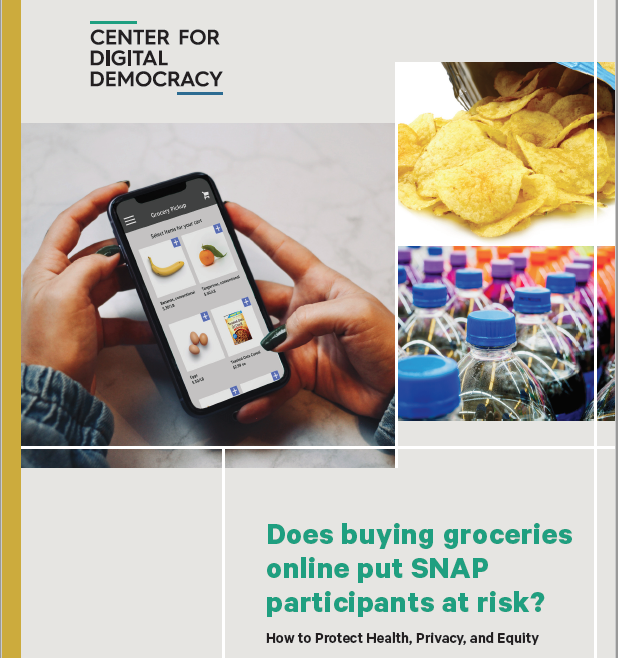USDA Online Buying Program for SNAP Participants Threatens Their Privacy and Can Exacerbate Racial and Health Inequities, Says New Report

Contact: Jeff Chester
jeff@democraticmedia.org (link sends e-mail)
202-494-7100
Katharina Kopp
kkopp@democraticmedia.org (link sends e-mail)
https://www.democraticmedia.org/
USDA Online Buying Program for SNAP Participants Threatens Their Privacy
and Can Exacerbate Racial and Health Inequities, Says New Report
Digital Rights, Civil Rights and Public Health Groups Call for Reforms
from USDA, Amazon, Walmart, Safeway/Albertson’s and Other Grocery Retailers
Need for Safeguards Urgent During Covid-19 Crisis
Washington, DC, July 16, 2020—A pilot program designed to enable the tens of millions of Americans who participate in the USDA’s Supplemental Nutrition Assistance Program (SNAP) to buy groceries online is exposing them to a loss of their privacy through “increased data collection and surveillance,” as well as risks involving “intrusive and manipulative online marketing techniques,” according to a report from the Center for Digital Democracy (CDD). The report reveals how online grocers and retailers use an orchestrated array of digital techniques—including granular data profiling, predictive analytics, geolocation tracking, personalized online coupons, AI and machine learning —to promote unhealthy products, trigger impulsive purchases, and increase overall spending at check-out.
While these practices affect all consumers engaged in online shopping, the report explains, “they pose greater threats to individuals and families already facing hardship.” E-commerce data practices “are likely to have a disproportionate impact on SNAP participants, which include low-income communities, communities of color, the disabled, and families living in rural areas. The increased reliance on these services for daily food and other household purchases could expose these consumers to extensive data collection, as well as unfair and predatory techniques, exacerbating existing disparities in racial and health equity.”
The report was funded by the Robert Wood Johnson Foundation, as part of a collaboration among four civil rights, digital rights, and health organizations: Color of Change, UnidosUS, Center for Digital Democracy, and Berkeley Media Studies Group. The groups issued a letter today to Secretary of Agriculture Sonny Perdue, urging the USDA to take immediate action to strengthen online protections for SNAP participants.
USDA launched (link is external) its e-commerce pilot last year in a handful of states, with an initial set of eight retailers approved for participation: Amazon, Dash’s Market, FreshDirect, Hy-Vee, Safeway, ShopRite, Walmart and Wright’s Market. The program has rapidly expanded (link is external) to a majority of states, in part as a result of the current Covid-19 health crisis, in order to enable SNAP participants to shop more safely from home by following “shelter-in-place” rules. Through an analysis of the digital marketing and grocery ecommerce practices of the eight companies, as well as an assessment of their privacy policies, CDD found that SNAP participants and other online shoppers confront an often manipulative and nontransparent online grocery marketplace, which is structured to leverage the tremendous amounts of data gathered on consumers via their mobile devices, loyalty cards, and shopping transactions. E-commerce grocers deliberately foreground the brands and products that partner with them (which include some of the most heavily advertised, processed foods and beverages), making them highly visible on store home pages and on “digital shelves,” as well as through online coupons and well-placed reminders at the point of sale. Grocers working with the SNAP pilot have developed an arsenal of “adtech” (advertising technology) techniques, including those that use machine learning and behavioral science to foster “frictionless shopping” and impulsive purchasing of specific foods and beverages.
The AI and Big Data operations documented in the report may also lead to unfair and discriminatory data practices, such as targeting low-income communities and people of color with aggressive promotions for unhealthy food. Data collected and profiles created during online shopping may be applied in other contexts as well, leading to increased exposure to additional forms of predatory marketing, or to denial of opportunities in housing, education, employment, and financial services.
“The SNAP program is one of our nation’s greatest success stories because it puts food on the table of hungry families and money in the communities where they live,” explained Dr. Lori Dorfman, Director of the Berkeley Media Studies Group. “Shopping for groceries should not put these families in danger of being hounded by marketers intent on selling products that harm health. Especially in the time of coronavirus when everyone has to stay home to keep themselves and their communities safe, the USDA should put digital safeguards in place so SNAP recipients can grocery shop without being manipulated by unfair marketing practices.”
CDD’s research also found that the USDA relied on the flawed and misleading privacy policies of the participating companies, which fail to provide sufficient data protections. According to the pilot’s requirement for participating retailers, privacy policies should clearly explain how a consumer’s data is gathered and used, and provide “optimal” protections. A review of these long, densely worded documents, however, reveals the failure of the companies to identify the extent and impact of their actual data operations, or the risks to consumers. The pilot’s requirements also do not adequately limit the use of SNAP participant’s data for marketing. In addition, CDD tested the companies’ data practices for tracking customers’ behavior online, and compared them to the USDA’s requirements. The research found widespread use of so-called “third party” tracking software (such as “cookies”), which can expose an individual’s personal data to others.
“In the absence of strong baseline privacy and ecommerce regulations in the US, the USDA’s weak safeguards are placing SNAP recipients at substantial risk,” explained Dr. Katharina Kopp, one of the report’s authors. “The kinds of e-commerce and Big Data practices we have identified through our research could pose even greater threats to communities of color, including increased commercial surveillance and further discrimination.”
“Being on SNAP, or any other assistance program, should not give corporations free rein to use intrusive and manipulative online marketing techniques on Black communities,” said Jade Magnus Ogunnaike, Senior Campaign Director at Color of Change. “Especially in the era of COVID, where online grocery shopping is a necessity, Black people should not be further exposed to a corporate surveillance system with unfair and predatory practices that exacerbate disparities in racial and health equity just because they use SNAP. The USDA should act aggressively to protect SNAP users from unfair, predatory, and discriminatory data practices.”
“The SNAP program helps millions of Latinos keep food on the table when times are tough and our nation’s public health and economic crises have highlighted that critical role,” said Steven Lopez, Director of Health Policy at UnidosUS. “Providing enhanced access to healthy and nutritious foods at the expense of the privacy and health of communities of color is too high of a price. Predatory marketing practices have been linked to increased health disparities for communities of color. The USDA must not ignore that fact and should take strong and meaningful steps to treat all participants fairly, without discriminatory practices based on the color of their skin.”
The report calls on the USDA to “take an aggressive role in developing meaningful and effective safeguards” before moving the SNAP online purchasing system beyond its initial trial. The agency needs to ensure that contemporary e-commerce, retail and digital marketing applications treat SNAP participants fairly, with strong privacy protections and safeguards against manipulative and discriminatory practices. The USDA should work with SNAP participants, civil rights, consumer and privacy groups, as well as retailers like Amazon and Walmart, to restructure its program to ensure the safety and well-being of the millions of people enrolled in the program.
###

